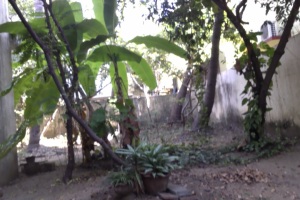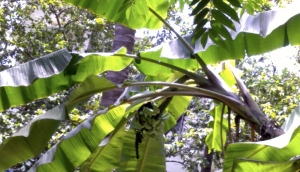At the fruit stall, the ubiquitous “Pazhamudir” fruit/ vegetable supermarket in Chennai I browse bananas. Deciding, as usual, on the yelakki variety, I pick up a few of those small, but flavorful, variety. Ganesh is diabetic and, spotting the fruit, is liable to consume them at will. Warned by Rohini, his wife, I confine myself to just six, each fruit merely a mouthful. All us Indians from the southern states, Kerala, Tamilnadu, and Karnataka, must have bananas about the place, within reach as a snack.
Warned by Rohini, his wife, I confine myself to just six, each fruit merely a mouthful. All us Indians from the southern states, Kerala, Tamilnadu, and Karnataka, must have bananas about the place, within reach as a snack.
The bigger variety of fruit, nendrakkai, is often steamed for breakfast, gooey and sweet with a faint sour undertone. Bananas are part of any Indian household routine (the raw fruit is a staple in savory dishes) as well as sacred ritual (the long, broad leaves are tied to house gates and to vehicle fenders). An agricultural site suggests, “The banana culture in India is as old as Indian civilization” [http://www.ikisan.com/Crop%20Specific/Eng/links/ap_bananaHistory.shtml]. Over 200 species exist in the country. Choosing which banana to serve at what occasion is a matter of some thought. Although, varieties still abound, Indian banana species in the wild, particularly in the hills of the north-east, run the risk of extinction. [http://www.nbcnews.com/id/12702822/]
Settling down to write in Ganesh’s sit out, I draw my chair under the shade. Supporta, Guava, Neem, Banana, and Coconut trees share space with each other. As I look about me, I am disinclined to face my Mac Book. I wish rather to absorb the particularly ‘Madras‘ (not ‘Chennai’) feel of a childhood long left behind. Memories of school days in the heat drift back–long afternoons at home that I spent under the shade of trees in another backyard. Nostalgia for that atmosphere particular to the tropics, of heat and growing things, renders my head heavy, resistant to embark on any analysis. I’d rather focus on those fragile yet heavy banana saplings, still thriving in a Madras turned Chennai of black dust and smog.
As I look about me, I am disinclined to face my Mac Book. I wish rather to absorb the particularly ‘Madras‘ (not ‘Chennai’) feel of a childhood long left behind. Memories of school days in the heat drift back–long afternoons at home that I spent under the shade of trees in another backyard. Nostalgia for that atmosphere particular to the tropics, of heat and growing things, renders my head heavy, resistant to embark on any analysis. I’d rather focus on those fragile yet heavy banana saplings, still thriving in a Madras turned Chennai of black dust and smog.
When I’d dug out the six yelakki bananas at the bottom of the bag, from under the rest of the fruit, Rohini had flashed her sudden, toothy smile and darted out of the back door; she bustled past the well in the yard behind the kitchen, past mosquito nets hung to be washed, past sundry coconut palms, and had rounded the corner to exclaim in delight:
“see, see, I’ve planted yelakki banana trees. Can you see the green bananas?”
I couldn’t, even to please her, spot them then, but, now, seated here, I look up and notice a bunch of them. Unripe green as they are, the bananas play into the muted symphony of greens about me, in contrast to the gray, dusty pallor of the trees and shrubs that front the busy road.
Unripe green as they are, the bananas play into the muted symphony of greens about me, in contrast to the gray, dusty pallor of the trees and shrubs that front the busy road.
I probe, later: “how often do you water the plants?”
Rohini specifies that she watered them each day with water from the well, although now the duty has been taken over by Ganesh. As the well is not connected to an electric pump, watering is a chore. Each evening I’ve been here, Ganesh procrastinates as he dislikes lugging buckets of water around the yard. But, as I wash dishes the first evening, he hovers over me:
“Hey, don’t waste water. I save the rinse water to pour on the plants.”
When I press him about how often he actually waters the garden, however, he evades me. Despite his lackadaisical watering, the garden is healthy, though the grimy foliage at the front demands attention.
Madras/Chennai endures, now and in the past, perennial water shortage. The Metro Authorities have already warned the city’s inhabitants that water will not be supplied for the next two months, April and May, as the rains have failed this year. Living in an independent bungalow as they do, Rohini and Ganesh, will need to buy water, delivered to them and fed into their sump (underground tank) by private companies. Most houses and apartment complexes include a bore well, drilled to enormous depths to reach water. Despite this measure, they buy tankers of water as well. With bore wells constantly sunk in most cities, ground water tables have diminished all over the country. In the newspaper, I read that the city council will sink new bore wells to depths of 100 feet to replenish dwindling reservoir levels. [http://www.thehindu.com/news/cities/chennai/borewells-to-be-revived-to-augment-citys-water-supply/article4559183.ece] “The major reason for declining water tables is due to more water extraction to sell to urban areas,” a researcher informs me through the web. [http://www.worldwaterweek.org/documents/WWW_PDF/Convernors/2012/ACaseStudy.pdf]
As cities get bigger, and living standards more luxurious, the threat of drought and water scarcity lose their menace. City dwellers extend their budgets to include the cost of buying water even as they grumble about it. We may adjust our routines to save a bit more water, but buying more is easier. The poor don’t waste much water as they have to carry buckets of it from a common pump or Metro tanker back to their homes. The sheer labor of the task forces them to save water. Ganesh grumbles,
“people are soooo dirty in this city. Get on a bus, and, gosh, the smell. They don’t bathe every day.”
He continues, “I prefer the West coast, the streams and the rivers there. No water shortage. People are cleaner.”
I live in a universe that is inextricably interlinked, the shell to sand to the human foot to the stars. When I brush an ant off my sleeve and it tumbles down dead, I must set in motion an event which causes another. Who is to say that the death of an unknown ant has no effect? As humans progress, we colonize the world in our name. But, the world may rebel; we, as a species, must also be kept in check. Water taken from the ground must find its way back to the earth.
[One of artist Nickolay Lamm’s images of what the United States’ landmarks might look like in 500 years, when sea levels are predicted to rise by 25 feet. http://flavorwire.com/385231/disturbing-photos-of-landmarks-ruined-by-rising-sea-levels/]
“…groundwater depletion adds about 25 percent to projected rates of sea-level rise, making it the largest contributor from land to sea-level rise other than the melting of the Greenland and Antarctic ice sheets. Even the melting of glaciers in the world’s high mountains won’t contribute more to rising sea levels.” [http://news.nationalgeographic.co.in/news/2012/05/120531-groundwater-depletion-may-accelerate-sea-level-rise/]
The poetry of such reaction sets me gasping for god. Process is all, everything in the universe lives and dies, and is equal in its being to another. If I spray a cockroach dead, I cannot ask that earth protect in my turn from what awaits, destiny, process, reaction, the cosmic/anarchic verse!
I sweep out my room, but black dust accumulates each day. In crevices under cupboards, on window ledges, on the soles feet, I spy that black grime. My car has settled under its cloak of dust in the front. Even before I begin a fight against dirt, I relinquish the battle saving my energy for skirmishes in traffic, scrimmage with financial accounts, and allergies that flourish. Much as the back yard beckons, I resist dreams of the old Madras life. I am child in the vast playground of sand and stars, good and bad, life.
Related articles
- ~Banana Stems, step-by-step how to prepare for soup and curry recipe~ (ilovethaicooking.wordpress.com)
- my banana boys (simplelittlespaces.wordpress.com)
- Banana And Onion Soup (ireport.cnn.com)
- The Last Banana (casualmisc.wordpress.com)
- Nutella Swirled Banana Bread (suaspontelife.wordpress.com)
